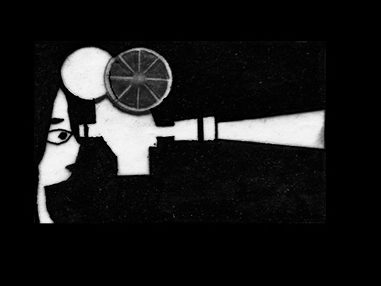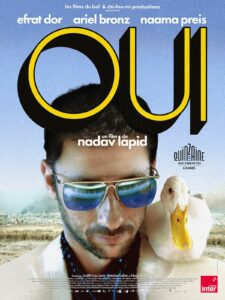Yes: Nadav Lapid’s Unsettling Portrait of Israel After
October 7
Premiered at the Directors’ Fortnight in Cannes 2025, Yes has sparked both admiration and controversy, especially in Western media where it is often hailed as an avant-garde political masterpiece. But behind this ovation lies a complex, inaccessible, and narratively problematic work, particularly regarding its take on history.
A Fatal Portrait of Israel After October 7, 2023
The film follows Y., a jazz musician, and Jasmine, a dancer. Their child was born on October 8, 2018, a tragically symbolic date, since the boy turned five on October 7, 2023, as the country plunged into chaos. This parallel fuels the unspeakable grief that radiates through the story.
Y. is a man who says “yes” to almost everything. He sings, gives himself away, sells out, embodying the figure of a man surrendering to an increasingly absurd world. His wife Jasmine reproaches this passive stance while clinging to a fragile illusion of happiness. The couple is battered by both external political brutality and internal emotional fracture. The film thus questions the role of the father in a world where surviving becomes a moral struggle and where saying “yes” risks veering into complicity.
Another major presence in the film is Y.’s ex-girlfriend, who plays a key role translating the horrors of October 7 into all languages. Yet, the film shows no real images of the attack, while the bombings in Gaza are presented in real time. This is neither a neutral nor innocent choice.
A Sensory and Formal Whirlwind
Lapid pushes his cinematic language to its limits. The image bursts into overlays, the narrative breaks down into sound and visual ruptures, creating a hypnotic chaos that risks losing the viewer. The influence of Godard and Lynch is clear in the fragmentation and absurdity, but without the emotional anchor those directors maintained. Here, the opacity can alienate part of the audience.
The Silence of the Hostages
The film omits entirely the hostage crisis, hundreds of Israeli civilians taken on October 7, one of the most current and emotionally charged aspects of the tragedy. This absence, combined with a strong focus on Gaza bombings, creates a troubling imbalance. Artistic silence, in this case, blurs rather than clarifies, leaving a bitter taste in the face of such a sensitive issue.
Exile, Spleen, and Paradox
Lapid has described himself as “someone of no,” which led to his self-imposed exile from Israel. Yet, his film is titled Yes, a paradoxical affirmation running through the pain of a man torn from his homeland yet still haunted by it. The unnamed character Y. could be seen as a refusal to fully inhabit a given reality. Did Lapid wish this story had never taken shape? And yet it exists, and the fictional anthem in the film is inspired by a real poem from Israeli writer Haim Gouri.
From Fraternity to Vengeance: The Heart of the Film
Gouri’s original poem, celebrating peace and brotherhood, was later distorted into a violent call for revenge after October 7. In Yes, this chant is weaponized, sung by children in a chilling propaganda video, calling for Gaza’s eradication. Lapid uses this to blur fiction and documentary, exposing how art can be militarized and twisted in service of nationalist hatred.
Yes and the Isolation of Israeli Cinema
For the past two years, Israeli cinema has been nearly absent from international distribution, culturally and politically sidelined. Yes is a rare exception, drawing disproportionate visibility, and with it, a heavy responsibility. The film is both a personal artistic cry and, at times, a misappropriated mouthpiece of a nation in crisis.
A Visceral Yet Frustrating Work
Yes is a powerful and sensory experience, articulating Israel’s trauma after October 7. Yet its opacity, silences, and narrative imbalances raise serious questions. While Lapid pours out a deeply personal pain, the film dodges key debates about history and collective responsibility. It provokes thought, but more than anything, it deserves to be debated, not blindly adored.
Trailer



